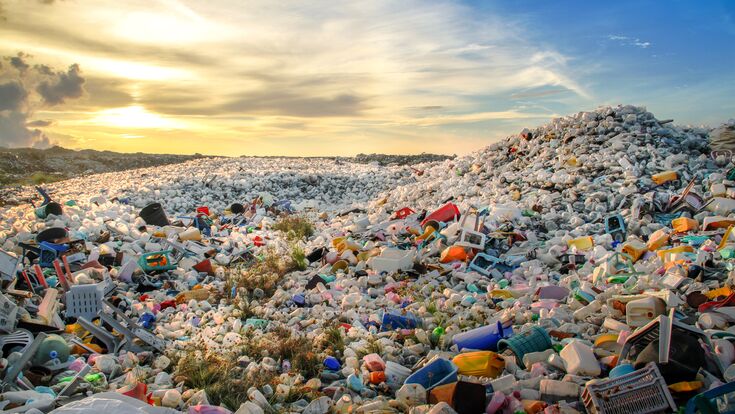Guest commentary : As the plastic waste treaty collapses, the recycling industry must step forward to address plastic pollution in 2025

The collapse of the United Nations-backed summit on plastic waste in Busan last week marked a critical setback in addressing a growing climate threat. More than just a diplomatic setback—it's a wake-up call for the recycling industry. While nations struggled to reach a consensus on binding targets for the reduction of plastic production and recycling, the climate crisis continues to accelerate.
This failure to reach a multilateral agreement on plastic pollution is particularly striking given the recent success at COP29, where 30 nations united to address food waste emissions. While one environmental challenge saw meaningful progress through coordinated action, another equally crucial issue now lacks the global framework it desperately needs. Food waste, the world's third-largest source of methane emissions, and plastic waste, which would rank as the fifth-largest greenhouse gas emitter if it were a country, share striking parallels.
Both represent systemic inefficiencies in how we manage resources, and to address them, we most often need collaborative solutions across industry, government, and society. However, given that plastic production could triple to make up one-fifth of our planet's remaining carbon budget in the years ahead, we can’t wait for the perfect public policy to address the plastic waste crisis. The recycling industry in developed nations must step forward to address this pollution head-on. Here are three ways how:

Creating a global framework for tracking plastic waste
Overall, more than 92% of recyclable materials do not get recycled, reused, or repurposed and end up in landfills, burned in incinerators, or mixed into nature through oceans and soils. Every year, new research illustrates how this pollution disrupts natural ecosystems and leads to biodiversity loss, and 2025 will be a tipping point as more findings come to light.
While limiting production - especially of single-use plastics - is a crucial part of the equation in addressing the plastic waste crisis, if recycling becomes more efficient and profitable, plastic pollution could be reduced by 20% by 2040. To make recycling more stable and profitable as an industry, we need to be able to track plastic waste post-consumption.
Today, only 1% of waste is monitored in most waste facilities using resource-intensive, manual processes. Where data does exist, it often provides an incomplete picture. Optical sorters gather useful information, but it's often limited to detailed parameters like polymer type. Furthermore, most of the data they collect only accounts for one of the sorting stages of the recovery process, rather than a holistic picture of everything that enters and eventually leaves an MRF.
What's needed is an industry-wide digital infrastructure that tracks materials from collection through processing and final transformation into new products. This framework should standardize data collection across facilities, enabling real-time monitoring of contamination rates, recovery efficiency, and material quality. By implementing such a system, facilities can identify bottlenecks, optimize sorting processes, and provide transparency to stakeholders throughout the value chain.
Setting standards for sustainable packaging design
Extended Producer Responsibility (EPR) policies are some of the most effective policy instruments for increasing recycling rates. If we cannot agree on standardized EPR policies across developed nations, we must support them as an industry at a local level.
That doesn’t mean that we simply shift the onus on recycling from consumers to waste producers. It means waste management and recycling companies must work in tandem with packaging producers to collect comprehensive and accurate recycling data - even down to brand or even stock-keeping unit (SKU) level - to give them the insights they need on the true recyclability of their products. That same data will provide an essential feedback loop as producers go on to design – and redesign – more sustainable packaging to maximize recovery rates.
For something to be recyclable, it has to be collected, sorted, sent somewhere to be processed into another material, and then actually used again. Without the data to track this full post-consumption journey, packaging-led recycling will be as ineffective as the consumer-led recycling that came before it.
Implementation of AI and new technologies to ensure accurate identification of plastics within recycling facilities, preventing recyclable materials from ending up in landfills, incineration facilities, and oceans.
Leaning into waste digitization and AI
Solutions that can assist in digitizing waste - most notably AI - will underpin both the framework for tracking plastic waste and setting standards for sustainable packaging design. AI can almost immediately take the industry from 1% visibility into waste flows to 100% visibility in identifying and digitizing 5 million to 20 million waste materials per day in each plant.
As recycling operators face current economic headwinds such as labor shortages, the increasing cost of energy, and the fluctuation in the price of recycled plastics, they’re turning to more holistic plant optimization solutions with AI, and this new data at the center. We’re seeing wastefacilities use this AI-first approach to detect blockages and reduce downtime.
In other areas, AI-powered data solutions offer significant cost efficiencies. Consider samplingcosts: manual sampling of 4.6 tons of PET typically costs around $3,500, while AI-drivensampling reduces this to approximately $6.25. Most importantly, they’re recapturing recyclablematerials that previously ended up in the residue line destined for landfills and othernon-environmentally friendly outcomes.
The path forward
The collapse of negotiations in Busan doesn't mean we must accept defeat in addressing plastic pollution. Rather, it signals that the recycling industry across developed nations must step forward to fill the leadership void.
The success of the food waste agreement at COP29 demonstrates what's possible when stakeholders unite around clear goals and measurable standards. Without waiting for perfect policy, the recycling industry must now lead the way in implementing practical solutions to address the plastic waste crisis. The time for industry-led action is now.
The views and opinions expressed in this article are those of the author and do not necessarily reflect the official policy or position of WMW


